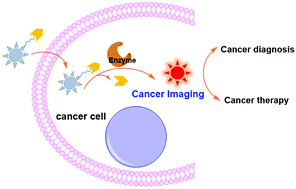Recent progresses in small-molecule enzymatic fluorescent probes for cancer imaging
Abstract
Abnormal enzymatic activities are directly related to the development of cancers. Identifying the location and expression levels of these enzymes in live cancer cells have considerable importance in early-stage cancer diagnoses and monitoring the efficacy of therapies. Small-molecule fluorescent probes have become a powerful tool for the detection and imaging of enzymatic activities in biological systems by virtue of their higher sensitivity, nondestructive fast analysis, and real-time detection abilities. Moreover, due to their structural tailorability, numerous small-molecule enzymatic fluorescent probes have been developed to meet various demands involving real-time tracking and visualizing different enzymes in live cancer cells or in vivo. In this review, we provide an overview of recent advances in small-molecule enzymatic fluorescent probes mainly during the past decade, including the design strategies and applications for various enzymes in live cancer cells. We also highlight the challenges and opportunities in this rapidly developing field of small-molecule fluorescent probes for interventional surgical imaging, as well as cancer diagnosis and therapy.



 Please wait while we load your content...
Please wait while we load your content...